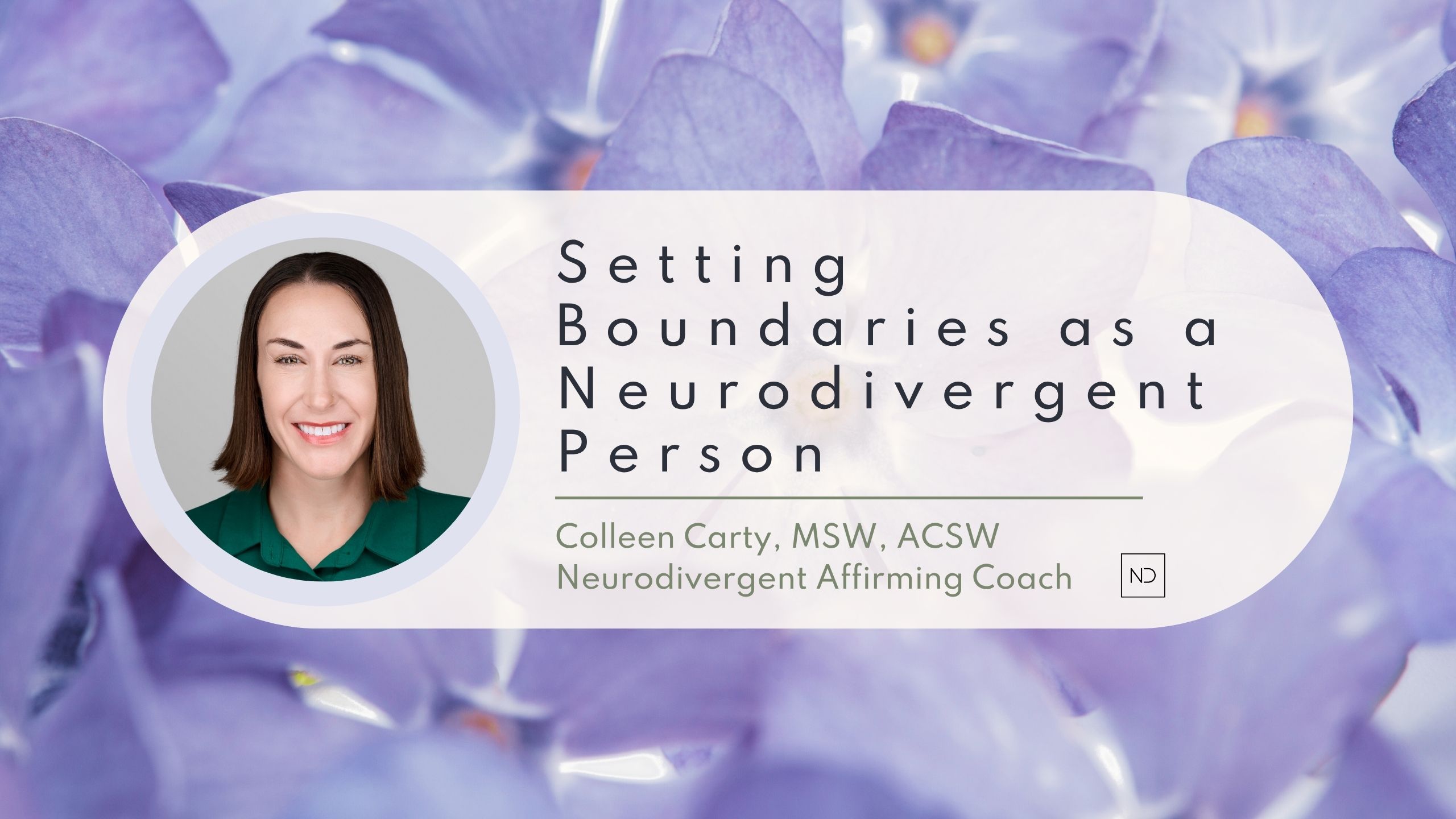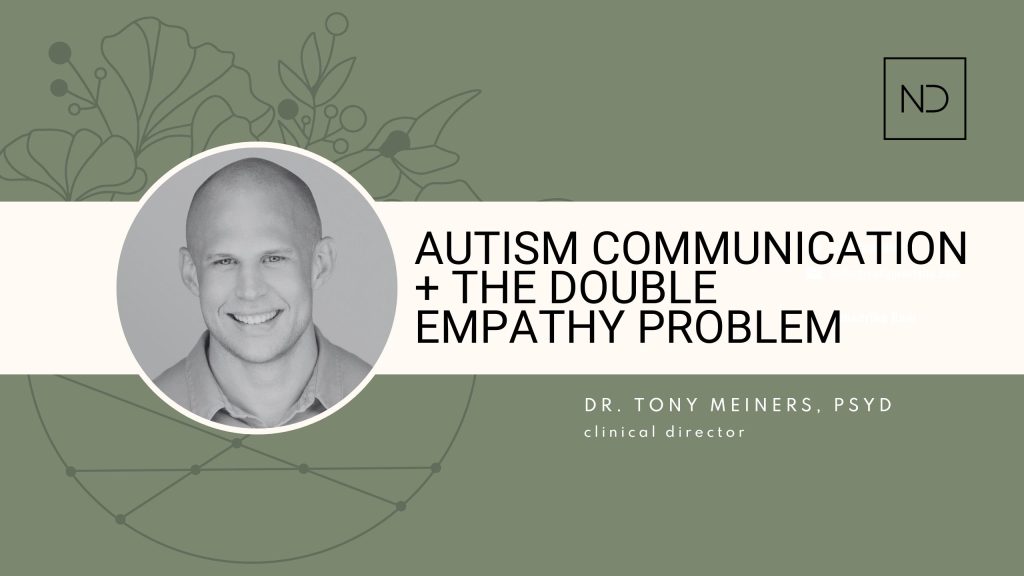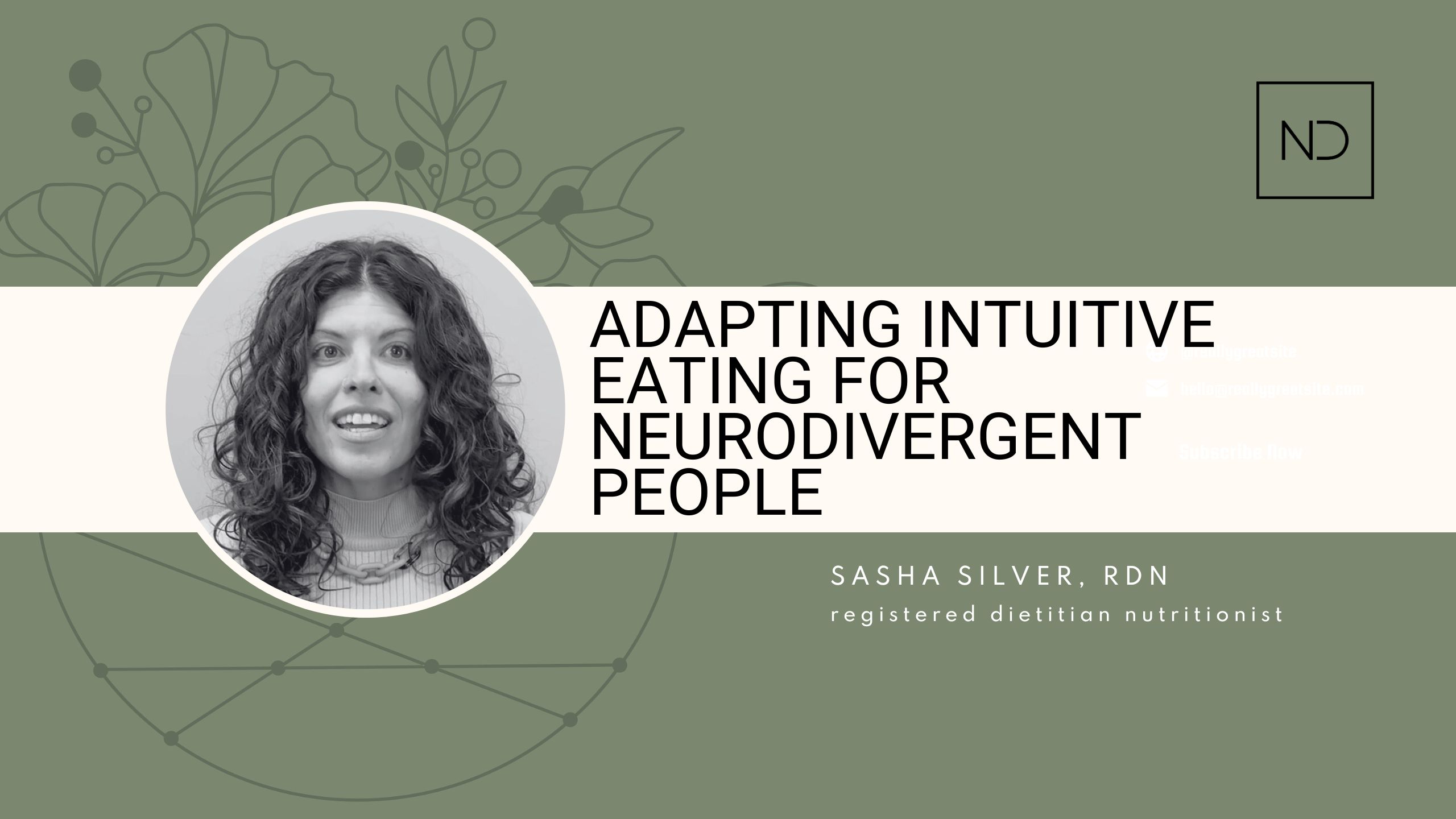
Setting Boundaries as a Neurodivergent Person
Written by: Colleen Carty, MSW, ACSW :: Neurodivergent Affirming Coach
Setting Boundaries as a Neurodivergent Person: Why It’s Hard, Why It’s Important, and How to Do It
For neurodivergent individuals, setting boundaries can be especially challenging. Boundaries are the guidelines we establish to protect our well-being, our time, and our energy. Boundaries are crucial for an individual to maintain their emotional and physical well-being. They help us to define what is acceptable and unacceptable in our interactions with others, our environment, and ourselves. They include physical boundaries (ex: needing personal space or a quiet environment), emotional boundaries (ex: requiring respect and understanding in your relationships), or even time-related (ex: how much time you are willing to dedicate to a task or to others). Boundaries are how we communicate our needs. They help us to maintain a sense of control over our lives and establish relationships based on respect and mutual understanding.
Why Setting Boundaries Is Hard when We Are Neurodivergent
- Understanding Social Cues:
Many neurodivergent people struggle with reading or interpreting social cues, which can make it harder to recognize when it’s time to set a boundary or communicate one effectively. For example, you may have difficulty understanding subtle signs that they are beginning to feel overwhelmed, leading to delayed or missed opportunities to set boundaries. - Avoidance of Conflict
Neurodivergent people, especially those who experience heightened sensory sensitivities or anxiety, might naturally avoid situations that may develop conflict. This can make it difficult to assertively communicate boundaries, as they worry about upsetting others or making the situation more uncomfortable. This can lead to people-pleasing behaviors where boundaries are ignored to avoid confrontation. - Cognitive Overload
Neurodivergent individuals often experience cognitive overload, which makes it more challenging to process and respond to social situations in real-time. When overwhelmed by sensory input, emotions, or too much information, it can be difficult to clearly identify personal needs and assert boundaries. Cognitive overload can make boundaries seem like just one more task to handle in a world that already feels like it’s too much. - Implementing Self-Advocacy
Advocating for oneself is a skill that takes practice, and it can be especially difficult for neurodivergent individuals who might not have been encouraged to express their needs or desires growing up. Internalized beliefs like “I don’t deserve to take up space” or “My needs aren’t as important” can contribute to difficulty in establishing and maintaining boundaries. - Sensory Sensitivity
Many neurodivergent people experience heightened sensitivity to sensory stimuli, such as loud noises, bright lights, or crowded spaces. When these sensory overloads occur, it becomes harder to recognize when you need a boundary to protect yourself. Additionally, sensory overload can cause shutdowns, which further complicate the ability to express the need for boundaries.
Why Setting Boundaries is Especially Important When You’re Neurodivergent
- Protecting Mental and Emotional Health
Without boundaries, you might feel overwhelmed, misunderstood, or taken advantage of. Protecting your mental and emotional health is vital. Clear boundaries help protect against burnout, emotional fatigue, and feelings of overwhelm. - Fostering Positive Relationships
Healthy relationships are based on mutual respect and understanding. Setting boundaries allows you to communicate your needs in a clear and respectful manner, which helps foster relationships where both parties understand and support each other. This creates a space where you can feel safe and valued. - Supporting Self-Worth
By setting boundaries, you affirm your own worth. Neurodivergent individuals often feel pressure to conform to societal expectations or fit into neurotypical molds. Setting boundaries is an act of self-care and self-respect, showing that your needs are valid and worthy of attention. - Reducing Overwhelm and Burnout
When you’re constantly accommodating others without taking your own needs into account, it can lead to burnout. Boundaries help reduce this by creating space for self-care and providing a way to say “no” without guilt. This is particularly important when neurodivergent individuals experience burnout at higher rates due to sensory overload or emotional exhaustion.
How to Set Boundaries as a Neurodivergent Person
- Identify Your Needs
The first step to setting boundaries is understanding your own needs. Ask yourself these questions: What makes you feel uncomfortable or overwhelmed? Are there situations where you feel drained or unsupported? Pay attention to your body’s reactions (e.g., feeling anxious, tired, irritable) as signs that a boundary might need to be set. - Start Small
If setting boundaries feels overwhelming, start small. Practice saying “no” in low-stakes situations. For example, if a friend asks you to do something you’re not comfortable with, it’s okay to say, “I can’t do that right now.” The more you practice, the easier it becomes to set boundaries in bigger or more complicated situations. - Use Clear and Direct Communication
Neurodivergent individuals often thrive when communication is clear and direct. When setting a boundary, use simple language. You might say, “I need some space right now,” or “I can’t participate in this conversation at the moment.” Avoid overly apologizing or over-explaining—your needs are valid without justification. - Be Consistent
Boundaries can be tested or pushed, especially by people who might not understand your needs. Consistency is key. If you communicate a boundary, stick to it. This helps teach others how to respect your limits, and it reinforces your own ability to advocate for yourself. - Prepare for Pushback
Not everyone will understand or respect your boundaries immediately, especially in environments where neurodivergent traits aren’t well understood. Practice self-compassion and remind yourself that it’s okay for people to not fully get it at first. If someone pushes your boundary, calmly restate it or remove yourself from the situation if necessary. - Find Allies and Support
Having a support system can make setting boundaries easier. Share your boundaries with trusted friends, family members, or even therapists. They can offer encouragement, hold you accountable, and help ensure that your boundaries are respected in your social or work circles. - Use Sensory Supports
If sensory overload is a concern, consider using sensory supports like noise-canceling headphones, sunglasses, hats or scarves, or a calming routine that helps you manage your environment. By taking proactive steps to create a space that works for you, it’s easier to recognize when a boundary needs to be set. - Be Kind to Yourself!
Setting boundaries is a skill that takes time and practice. Don’t expect perfection—mistakes are part of the learning process. If you feel guilty about setting a boundary, remember that you are protecting your well-being, which ultimately allows you to be your best self in relationships and other aspects of life.
Final Thoughts
Setting boundaries is a vital skill for everyone, but it can be especially challenging for neurodivergent individuals. However, it is also one of the most important tools for ensuring self-care, emotional well-being, and healthy relationships. By understanding the unique challenges faced by neurodivergent people in setting boundaries, and by using strategies like clear communication, practice, and self-compassion, you can build a life where your needs are respected, and your emotional and physical health is protected.
Remember: boundaries are not selfish—they are necessary for your well-being! You have every right to set them, and doing so will empower you to live a more authentic, balanced life.
Do you have a question?
Send us a message








